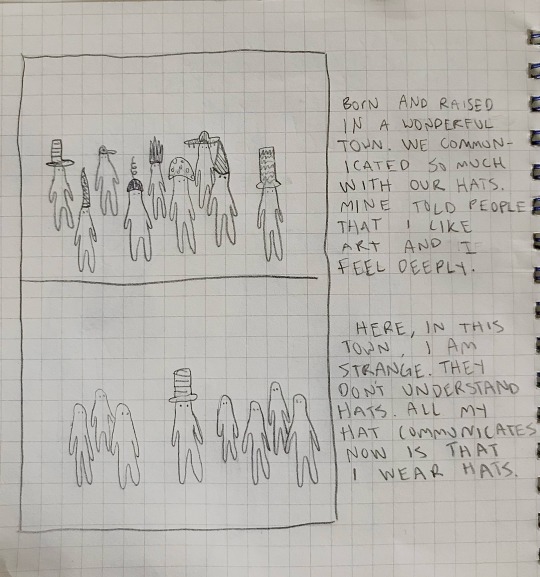#Cultural Norms
Text
I'm curious about cultural differences around kids calling adults by their first name with no title. My family is Jewish and we always did that, and it seemed the norm among my friends. Is that a particularly Jewish norm?
You define for yourself whether you're Jewish. I didn't grow up with any religious practice, but still feel culturally Jewish.
(In this I'm not counting teachers or other adults where school/other rules applied.)
This ignores a lot of things like age and country, and flattens the wide variety of non-Jewish cultures into one group, but all of that wouldn't fit into a tumblr poll so I'm simplifying it.
(There probably is actual information on this somewhere out there if I looked, but it's more fun to do a completely non-representative tumblr poll.)
#cultural norms#cultural anthropology#jumblr#jewblr#jewish culture#jewish life#judaism#jewish#tumblr polls#my polls#shower thoughts that become polls
416 notes
·
View notes
Text
Random thought:
In a world where it is customary to hold your breath while a member of royalty or higher rank is speaking
- Puffing your cheeks is a sign of respect, gratitude, etc
- Sighs, yawns, hiccups, and other forms of loud breathing are considered rude
- Ventriloquism is a respected art because it practices speaking without any sign of breathing or speech
- blue make up is popular because it makes it appear like you've held your breath for others often
- Plants are considered sacred because they purify the air that we taint with our breathing
- Masks are a popular accessory and many heavily traditionalists wear them
- ASMR is considered a horrid act of rebellion and younger generations use it to rebel
- Mouths and noses in general are considered impure
- Surgeries to make breathing more difficult or to breath without anyone noticing are common
- people take classes to breathe without anyone realizing
- Breathing exercises are as private of an event as using the washroom
- Laughter, singing, speaking loudly, and other forms of auditory pleasure are luxuries reserved for the nobility
- Body language is a more respectable form of communicating than speaking
- Speaking is someone you can only do with someone of equal or lower rank. It is offensive for someone of lower rank to speak to you.
- Rooms that get filled with toxic fumes are a punishment to teach respect. Wrong doers get locked in these rooms for up to four minutes.
- People of higher rank are considered cruel and selfish if they speak continuously for more than four minutes
- Executions are usually done through suffocation or toxic gasses
- People that breathe through their mouths are discriminated against and often end up becoming lower class, which leads to them being punished for breathing even more.
- Celebrities often buy personal machines that inject oxygen into their blood stream so they don't need to breath at all.
- Breathing/blowing on someone is considered incredibly rude. Blowing smoke at someone is an incredibly high offence.
- Edibles and syringes are more common for drug use than smoking since you're more likely to get caught
- Scented candles aren't nearly as popular. Neither is perfume. In fact things such as this are taboo. Why do you need air to smell better? Huh? Are you breathing it? Disgusting. Even scented hygiene products will earn you a few stairs.
- Knowing someone's scent is considered incredibly intimate
- The phrase: 'Don't hold your breath' is more used as permission to speak freely or like the phrase 'don't sweat the small stuff' than a sarcastic remark used when impatient
- The gesture of blowing a kiss is considered as offensive as the middle finger
- People with conditions such as Asthma have a similar role in society to people on the Autistic spectrum because they are either extremely patronized and pitied, shamed for their 'blatant disrespect', considered angels for going through so much, or are considered a sign that humanity is evolving towards not breathing
I could go on but I think I've built enough on this dystopian nightmare
#dystopia#world building#dystopian world#world building ideas#dystopian ideas#dystopian society#cultural norms#ableism#dystopian nightmare#fictional etiquette#long post#writing ideas#random thoughts
15 notes
·
View notes
Text
The Philosophy of Courage
The philosophy of courage explores the nature, value, and significance of courage as a moral and existential virtue. Courage is often regarded as the willingness to confront fear, danger, or adversity in pursuit of a noble or morally worthy goal. Philosophers have long grappled with questions about the origins of courage, its ethical implications, and its role in shaping human behavior and character.
Key aspects of the philosophy of courage include:
Definition and Nature: Philosophers examine the concept of courage and its various dimensions. They explore different definitions of courage, considering whether it involves the absence of fear, the ability to act despite fear, or the presence of certain virtues such as resilience, determination, or moral integrity. Philosophers also explore the relationship between courage and other moral virtues, such as justice, temperance, and wisdom.
Moral and Existential Courage: Courage is often divided into moral courage and existential courage. Moral courage involves standing up for one's principles, values, or convictions in the face of opposition or adversity. Existential courage involves confronting the uncertainties, challenges, and existential threats inherent in the human condition, such as mortality, meaninglessness, and existential angst.
Ethical Perspectives: Philosophers analyze the ethical significance of courage within different ethical frameworks, such as virtue ethics, deontology, and consequentialism. They explore questions about whether courage is inherently good, how it relates to other moral virtues, and whether there are moral limits or constraints on courageous action.
Psychological and Emotional Dimensions: Philosophers consider the psychological and emotional aspects of courage, including the role of emotions such as fear, anxiety, and resilience in shaping courageous behavior. They examine theories of emotion regulation, emotional intelligence, and moral development to understand how individuals cultivate courage in the face of adversity.
Social and Political Courage: Courage is often manifested in social and political contexts, where individuals challenge injustice, oppression, or wrongdoing. Philosophers explore the role of courage in promoting social change, defending human rights, and resisting tyranny or authoritarianism. They examine historical examples of courageous figures such as activists, whistleblowers, and revolutionaries who have risked their lives for the greater good.
Cultural and Historical Perspectives: Courage is influenced by cultural norms, values, and traditions, which shape how courage is understood and practiced in different societies. Philosophers study the cultural and historical roots of courage, tracing its evolution across time and cultures and examining how it is depicted in literature, art, and mythology.
Philosophical Exemplars: Philosophers often cite examples of courageous individuals or moral exemplars who embody the ideals of courage. These exemplars may include historical figures such as Socrates, Gandhi, and Martin Luther King Jr., as well as fictional characters from literature and mythology. Philosophers analyze the virtues and qualities that make these individuals courageous and explore the lessons they offer for moral and existential courage.
Overall, the philosophy of courage provides a framework for understanding and evaluating the significance of courage in human life, ethics, and society. It raises important questions about the nature of courage, its moral implications, and its role in promoting human flourishing and moral integrity.
#philosophy#epistemology#knowledge#learning#chatgpt#education#ethics#psychology#metaphysics#Courage#Moral Courage#Existential Courage#Virtue Ethics#Moral Philosophy#Social Justice#Political Activism#Emotion Regulation#Cultural Norms#Historical Perspectives
4 notes
·
View notes
Text
Morality is out there.
9 notes
·
View notes
Text
The Environment's Role in Spiritual Growth
Spiritual growth is an inward journey that involves deepening self-awareness, a connection to a higher purpose, and a pursuit of inner peace and enlightenment. Though one might perceive spiritual growth as purely internal, the environment plays an instrumental role in shaping this voyage.**The Outer Reflects the Inner**: Spirituality isn’t limited to the realm of meditation, prayers, or religious…

View On WordPress
#Agency#Cultural Norms#Emotional Climate#Enlightenment#Environment#Environmental Genetics#genetic predisposition#Human Development#Inner Peace#Introspection#Life Trajectory#Nature#Peer Influence#Personal Sanctuary#Self-Awareness#Socialization#Spiritual Community#Spiritual Growth#Spiritual Journey#Transformation
11 notes
·
View notes
Text
Touch in that pub scene
That's this one I am talking about:

I know we are all going feral over it, but tbh, what I was watching it, it did not strike me as special, simply because in a crowded pub people do touch each other (mostly on the shoulder, or on the back) to get attention, get past, etc. So I don't know of it was a special acting choice, or simply "we're in a pub" situation (and it is not unreasonable to assume that Michael and David have been to a pub together before). I have seen this gesture between men many times, I don't think most guys are even conscious about it. Anyhow, it is a delicious moment, but I am just not sure it is as extraordinary as the fandom might think.
11 notes
·
View notes
Text
European Union Court's Rulings on Headscarves: A Comprehensive Look at Bans on Burqa, Hijab, and Niqab in Europe and Other Parts of World
European Union Court's Rulings on Headscarves: A Comprehensive Look at Bans on Burqa, Hijab, and Niqab in Europe and Other Parts of World #EUCourt #HeadscarfBan #EuropeanLegislation #GenderEquality #Cultural Norms #Secularism
Embarking on a journey through the diverse landscape of headscarf bans in Europe unveils a complex tapestry of cultural dynamics, legal intricacies, and societal debates. The European Union’s top court, in a series of rulings, has shaped the narrative surrounding the wearing of headscarves, setting precedents that ripple across the continent. From Belgium’s landmark decision in 2011 to the…

View On WordPress
#Cultural Norms#EU Court#European Legislation#Freedom of Expression#Gender Equality#Headscarf Ban#Religious Symbols#Secularism
2 notes
·
View notes
Text

hat town
#conformity#moving#neurodivergent#cultural norms#autism#fitting in#self expression#transplant#upheaval#audhd#fashion#hats#culture#moomatahiko#naominoop#naominoop art#comics#aesthetic tumblr#artist on tumblr
14 notes
·
View notes
Link
3 notes
·
View notes
Note
If you are interested, in Israel, we call other adults by their first names. In schools, it depends on the teacher. Some teachers want to be called 'Teacher' only, while others hate it and ask us to call them by their first name only. Same with professors as well.
We don't do the whole Mr, Miss, Mrs in school at all. We use them in official documents or sometimes when we want to ask a stranger something. Israeli culture is rather informal tbh.
I personally always struggled with the teachers and professors who wanted the class to call them by their first name because I felt like I was being "too familiar" with them and disrespecting them as a result 😅😂
(This is in reference to this poll.)
Oh interesting! Thank you for writing in to let me know, I am interested. I've never been to Israel, but that was the vague impression that I had.
I've never minded calling professors or teachers anything, but I prefer when they actually tell us what they want to to be called so I don't have to guess lol.
Thanks anon!
#isreal#my questions answered#anon asks#asks answered#jumblr#jewblr#cultural norms#cultural anthropology
5 notes
·
View notes
Text
I do think it's funny that in newer SFF fandoms you're considered edgy and extra if you ship two villains with, like, maybe some light dub con, whereas in older anime fandoms you can stumble across the most ridiculous untagged beastiality gang bang gonzo porn with robot enemas and accidental underage stuff on a packed train, and this is just normal. You don't even have to go looking for it.
2 notes
·
View notes
Text

- Yuval Noah Harari
"Sapiens: a brief history of humankind", pg. 170
#yuval noah harari#Sapiens#sapiens: a brief history of humankind#gender#gender and identity#cultural norms#human biology#biology#books#book quotes#science#quotes
3 notes
·
View notes
Text
No Comparison
One thing that we all have in common is we are different which means there couldn’t be another you. You are your signature in this universe.
When people’s heart lurches while tossing away their head and saying you’re not good enough, brush it off with a smile, your existence is not dependent on their approval. Love every part of yourself, and flaunt your flaws, for flaws are somewhat small parts…

View On WordPress
#Authenticity#Comparison#Confidence#Cultural Norms#Dreams#Envy#Erwinism#Familial Expectations#Fulfillment#FYP#Growth#Honesty#Identity#Individuality#Inner Strength#Inspiration#Learning#Life#Love#Motivation#Perseverance#Progress#Reflection#Resilience#Self-Acceptance#Self-Criticism#Self-Discovery#self-improvement#Self-love#Societal Pressure
1 note
·
View note
Text
Long hair

View On WordPress
0 notes
Text
Mastering Mobile App Localization: The Ultimate Guide

#In an increasingly globalized world#mobile app localization is crucial for developers aiming to expand their reach and connect with international markets. Localization involve#content#and functionality to suit different languages#cultural nuances#and regional preferences. This comprehensive guide will walk you through the steps of effective mobile app localization#ensuring your app resonates with users around the world.#1. Understand Your Target Audience#Before diving into localization#it's vital to thoroughly understand the markets you are targeting. Research the languages spoken#cultural norms#legal requirements#and local technologies. This foundational knowledge will guide your localization strategy and help you prioritize which elements of the app#2. Internationalize Your App#Internationalization is the process of designing an app's architecture so that it can support multiple languages and regions without requir#text directions (like right-to-left scripts)#local date and time formats#and numerical values. Preparing your app in this way simplifies the subsequent localization process.#3. Localize Content and UI#The next step is to translate and localize the app’s content and user interface. This goes beyond mere translation; you must also adapt gra#icons#and layouts to align with local customs and expectations. It’s advisable to work with native translators who understand the linguistic subt#4. Adapt to Local Regulations and Legal Requirements#Different markets may have specific legal standards regarding data privacy#digital transactions#and censorship that can affect your app. Ensure that your app complies with local laws and regulations to avoid legal issues and build trus#5. Test and Optimize for Local Markets#Once localized#thoroughly test your app in each target market to catch any issues with translations#or functionality. Consider conducting usability tests with local users to gather feedback and understand their user experience. Use this fe
0 notes
Text
Tears of My Enemies: Unraveling the Psychological and Cultural Implications of Schadenfreude #BlogchatterA2Z
Tears of My Enemies: Unraveling the Psychological and Cultural Implications of Schadenfreude #BlogchatterA2Z #TearsOfMyEnemies #Psychology #CulturalNorms #EthicalDilemma #SocialDynamics #Empathy #HistoricalCelebrations #MediaRepresentation #SocialImpact
Exploring the Concept of “Tears of My Enemies”: A Multifaceted Examination
The expression “Tears of My Enemies” conjures images of victory and conquest, often evoking a sense of deep satisfaction derived from the defeat or downfall of adversaries. While on the surface it may seem straightforward, this phrase encapsulates a complex interplay of psychology, culture, ethics, and social dynamics.…

View On WordPress
#Cultural Norms#Empathy and Competition#Ethical Dilemmas#Historical Celebrations#Human Psychology#Media Representation#Moral Considerations#Schadenfreude#Social Dynamics#Social Media Impact
0 notes